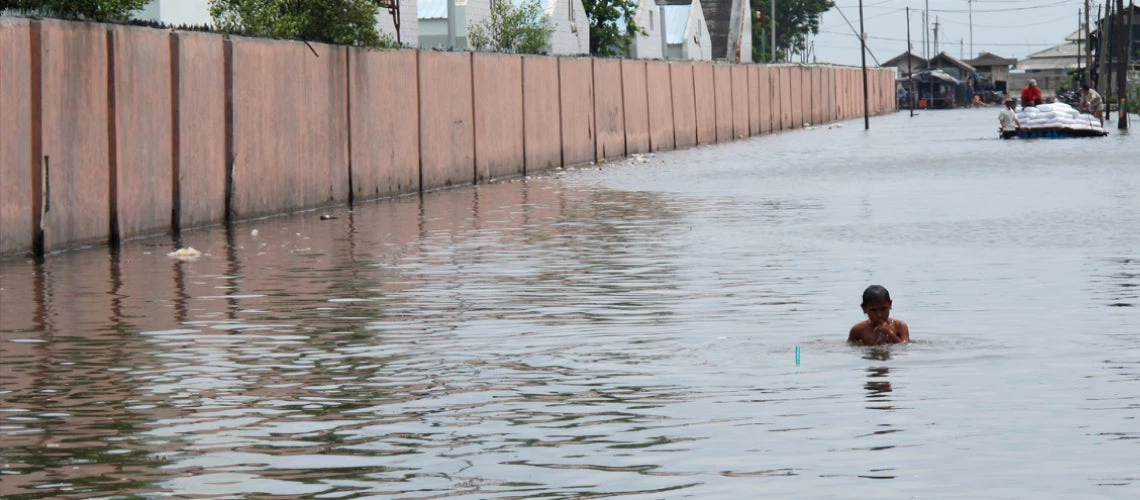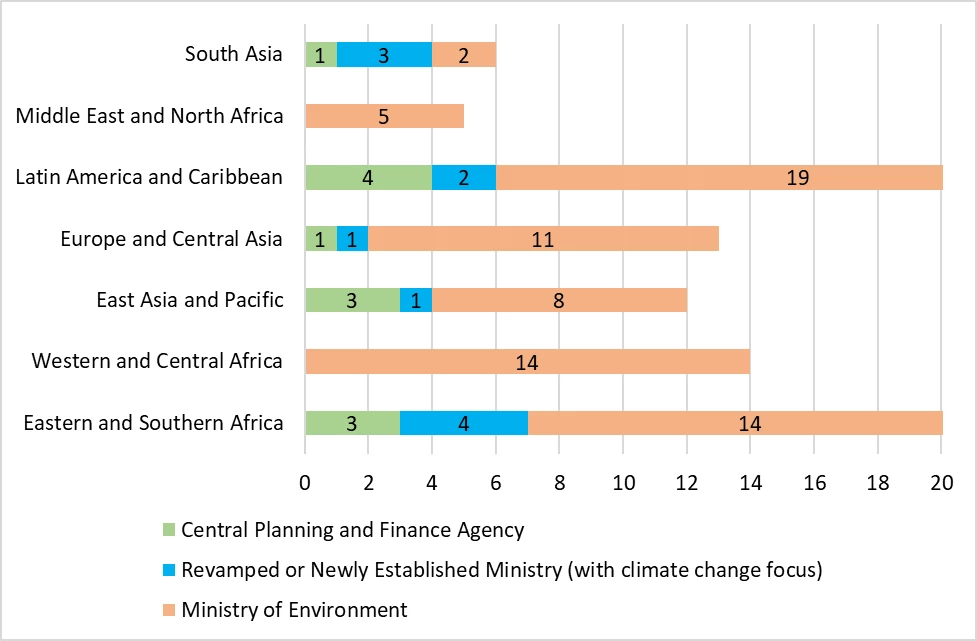 Farhana Asnap / World Bank
Farhana Asnap / World Bank
After a quasi-apocalyptic summer, with never seen before records of floods, droughts, and fires that affected millions of people across the planet, it is more urgent than ever to respond to this question: Who should respond to the formidable challenges of climate change?
A recent World Bank stocktaking exercise showed that 96 out of 132 countries had an established ministry or agency to lead the climate change agenda. In 73 countries, ministries of environment are identified as the main anchors to coordinate, monitor, and regulate all climate-related matters. Central planning and finance agencies have the institutional ownership of the climate change agenda in only twelve countries.
Figure 1. Institutional Ownership of Climate Change Agenda by Region
Institutions matter for climate change. Effective climate action requires a whole-of-economy and a whole-of-government response. Policy makers need to be able to make tradeoffs across development and climate policy objectives. They must translate the policy objectives into instruments considering the relative merits of information, regulation, taxation and public spending as policy tools. Policymakers also have to offer incentives to both the public and private sectors and to be able to enforce implementation. All of these considerations underscore the importance of having institutions take responsibility for climate policy, from presidencies and prime ministers’ offices, to planning and finance agencies depending on the country. Having said that, this institutional configuration is still the exception rather than the rule.
Historically, ministries of environment have taken the lead on the climate agenda to promote environmental sustainability, natural resource protection, and other conservation efforts. They also coordinate relevant policy implementation and the ratification of international agreements. However, their position outside the center of government prevents them from taking broader development polices into consideration and building consensus around effective solutions to climate change.
In the last decade, ministries of climate change have been established in 11 countries to prioritize action on this critical agenda. In Pakistan, the Ministry of Climate Change, which was established in 2017, is responsible for climate change-related policymaking and disaster risk management. The Ministry also facilitates and coordinates the mainstreaming of climate change programs and policies for federal and provincial departments. India and Bangladesh have also each created a Ministry of Environment, Forest and Climate Change, in 2014 and 2018 respectively. As opposed to ministries of environment, the goals and duties of ministries of climate change are more specific, which allows them to focus on addressing both economic and social impacts of climate change more effectively through tailored technical expertise. The downside is that ministries of climate change are unable to align climate targets with broader development and economic policies. And, due to their infancy, these ministries are often insufficiently resourced, have limited program and execution capabilities, and are unable to influence other national and subnational agencies.
As countries take on increasingly ambitious climate targets, the role of central planning and finance agencies becomes critical. These agencies are well-positioned to ensure that climate change goals are aligned with economic and development policies. They are also able to choose the appropriate instruments required to deliver policy objectives across information, regulation, taxation, and public spending. Central planning and finance agencies have the tools and levers in place to enable change and mobilize the needed response. Speaking at the Sixth Ministerial Meeting of the Coalition of Finance Ministers for Climate Action, UN Secretary-General António Guterres said, “Your decisions and actions in the coming weeks will determine whether the global economic recovery will be low-carbon, resilient and inclusive or whether it will lock-in fossil fuel-intensive investments with high risks of stranded assets…The world needs your leadership.”
“Your decisions and actions in the coming weeks will determine whether the global economic recovery will be low-carbon, resilient and inclusive or whether it will lock-in fossil fuel-intensive investments with high risks of stranded assets…The world needs your leadership.” - General António Guterres
Climate change is one of many and not necessarily the most pressing priority that governments face; nonetheless, taking institutional ownership of the climate change agenda is important. An effective response to climate change requires interventions from all government institutions and sectors of the economy . It also requires strong coordination between government and nongovernment stakeholders. Central planning and finance agencies are well-positioned to take the lead on setting climate policy so that climate change gets the attention – and resources – that it urgently deserves.



Join the Conversation